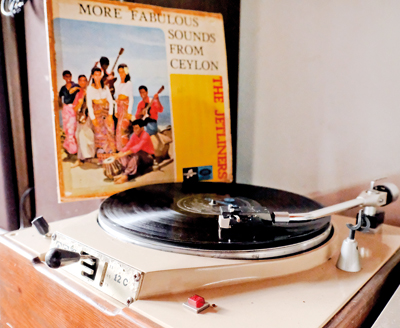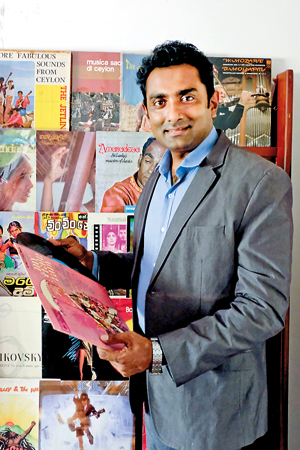Put the record on!
Music streaming services like Spotify and Apple Music give people access to large collections of music, and this is one reason why people moved away from buying and collecting any tangible forms of music, like cassettes, CDs and vinyl records.
 Interestingly, over the past few years, there has been a resurgence in the buying and collecting of vinyl records among young people. A worldwide trend, it has made its way to Sri Lanka in the recent past.
Interestingly, over the past few years, there has been a resurgence in the buying and collecting of vinyl records among young people. A worldwide trend, it has made its way to Sri Lanka in the recent past.
The Society of Sri Lankan Record Collectors’ (SSLRC) President Roshan Wedagamage actively promotes the sharing, collecting and listening of vinyl records through the “Analog Music Studio” WhatsApp group he created sometime back. The group has almost 200 members of various ages, with the youngest member being 17 years and the oldest more than 70 years.
Roshan grew up listening to music on cassettes and the radio. Introduced to vinyl records by one of his Professors when he studied for his Masters degree at Sri Jayawardenapura University, for the past 15 years he has spent time locating other collectors and hobbyists who share the same passion for analog music.
This led him to Pradeep Wickramasinghe, who is now the secretary SSLRC. Pradeep has a large collection of records, including long play (LP) and extended play (EP) records, magnetic tapes, CDs, cassettes in English, Sinhala, Tamil, Hindi and other languages, belonging to many music genres. He has also a collection of jukeboxes and turntables at the society’s headquarters in Nugegoda.
Roshan and Pradeep believe the collecting, preserving, sharing and even repairing of vinyl records, cassettes and other analog music and vintage music equipment is preserving our country’s culture.
“Sometime back, UNESCO had declared music, oral traditions, festivals, folklore, folk songs and dances a part of each country’s Intangible Cultural Heritage. As members of the SSLRC we collect analog music that contains old Sinhala songs and traditional music so we can share them with the future generations,” said Roshan.

Roshan Wedagamage with the society’s collection. Pix by Amila Gamage
Roshan and Pradeep encourage those interested in joining their society and their WhatsApp group to reach out to them on the following numbers: Roshan - 077 7339 051, Pradeep – 071 1389 656.
“This era of digital music and YouTube videos doesn’t offer music listeners the same experience as vinyl records do,” says vinyl enthusiast and collector Kaveen Rodrigo. His father collects and sells analog music from their home in Battaramulla.
“Records demand people to be active listeners. You spend time listening to an entire album, and not just one track,” he added.
Kaveen’s father, Asanka Rodrigo was a DJ and vinyl collector until the early 2000s when he embraced digital music. A few years ago however, he decided to begin collecting and selling analog music. Kaveen too began collecting records around the same time, but he has been a vinyl enthusiast since childhood.
“There are a lot of young people as well as older people, who visit our home to buy records from my father, because he uses Facebook to post photos of the records he gets from abroad,” he says.
Records with Sinhala songs and traditional music are rare, hard to find and usually quite expensive. “The most common record of Sinhala music that can be found is “The Sooriya Show” which was pressed by Sooriya Records in the 1970’s,” Kaveen says.
Kaveen said the resurgence in vinyl records is good news for small, independent artists, especially those who create music that belongs to less popular genres. Streaming services like Apple Music mainly benefit popular international artists with millions of fans, but independent artists find it difficult to gain profit from streaming services.
“Anyone with a laptop can make music. But vinyl records are definitely great for small, independent artists. Even if such artists release a few copies of their vinyl albums, they can gain a profit. I’ve bought albums by new, obscure artists, not just vinyl records, but mixtapes as well,” he said.
Kaveen is confident the trend of buying and collecting vinyl records will last for a long time. Not only does it benefit independent artists and cater to those with obscure music tastes, music fans in general can appreciate music better, he feels.
Rajith Maligaspe, another vinyl enthusiast and collector, said most people buy records as opposed to listening to digital music because they want a better experience.
“Even some modern artists release vinyl records, because records offer higher quality music. Many people from our generation and even the older generations collect and listen to vinyl records because there is also a vintage appeal to records,” Rajith said.
Rajith became interested in analog music when he was growing up, but didn’t start collecting and listening to vinyl records until about two years ago. He buys his records from music stores and dealers who have been in business for a long time. He advises against buying records online as there is no guarantee the records will be in good condition.
| More local musicians should release LPs | |
| Vinyl collector and enthusiast Tareeq Musafer is also a DJ who uses vinyl records to play music. DJ-ing has been a hobby of his since 1983, when he was 13 years old. “In the early 1980’s vinyl and cassettes were the only available mediums of music, so I started DJ-ing with cassettes and then graduated to vinyl,” Tareeq says. “I find the digital space easier to work with as opposed to vinyl. Digital music provides greater creativity whereas vinyl requires a higher level of technical skill to achieve the same,” he says. “Vinyl behaves very differently to digital music; perhaps the future is a combination of the two, which we are now seeing a lot of,” he adds. According to Tareeq people have responded positively to vinyl records being played at events. “I guess people like watching a DJ play vinyl, maybe because it’s a rare occurrence. I don’t play very often now but the few times I have, the response has been good.” “For our local vinyl market to grow we need local artists to release their music on records. A few musicians in the electronic music circuit are doing this right now, but I hope the Sinhala and Tamil contemporary musicians also release LPs, which was something common back in the day,” he says. |


